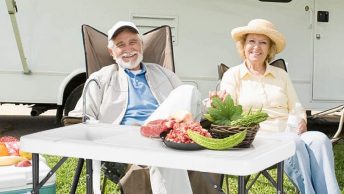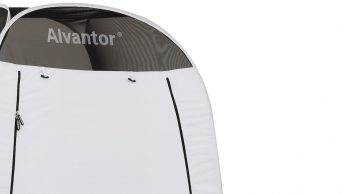Camping can be a great way to get out of the city and experience a quieter, more relaxed environment for a few days. It may be your first time adventuring out, so we have prepared a step-by-step guide to ensure you have all your essentials ready and prepared for your trip. Besides exploring the wild and making new memories, camping can also be a way to reduce your daily water consumption. We will, therefore, also highlight some ways in which you can conserve water and help the environment at the same time.
Camping Location
Before we get started, you need to know where you plan to camp. If it’s a campsite, you’re more than likely going to have access to running water and bathrooms. Whereas a national park usually means you’ll need to prepare more, but you can apply all the following tips and guidelines to make your camping experience an enjoyable one.
Camping Essentials

- The tent: A good working tent is vital to actually ‘camp.’ Before you leave for your destination, make sure your tent has all the necessary poles and attachments. It would be a disaster to find that something is missing, and now you’re stranded in the wilderness with nowhere to sleep. You should also take caution as to where you place your tent. In campsites, you’ll usually have a reserved or designated place to camp, whereas in a national park you’d have more freedom. With this freedom, you should strategically place your tent on a flat dry surface between the trees to reduce the winds.
- Sleeping bags and pillows: Sleeping bags are pretty standard to everyone, but avoid substituting them with blankets. Sleeping bags are more compact and roll up when it’s time to move campsite. Another great tip is to invest in a camping pillow. Don’t go using a pillow from home or a jersey to rest your head. As tempting as it is to save some money, a camping pillow can make a world of difference when having a good night’s sleep. They also allow you to save space when deflated and stored in mini bags among your luggage.
- Lighting: Remember to bring a few torches and batteries for your nightly excursions. Most of us will probably rely on the campfire, but don’t let this deter you from investing in some solar torches or camping lanterns. You never know what to expect in the dark, and it will give you better peace of mind going for your bathroom break with a lighted walkway.
- Stove: Campfires might not be for everyone when cooking, so try getting a two-burner propane camp stove if you’re planning on cooking bacon and eggs. Always pack fuel canisters based on trip duration, and check that everything is working before heading out. If you’re camping for a weekend from the back of your car, a portable grill is a good option as well.
- Plates, cups, and sporks: All this talk about cooking, and you shouldn’t forget about your plates, cups, and sporks. Generally, try using metal and hard plastic items to avoid breakage when transporting. Knives and forks will only take up more space, so get in the camping mood and adjust to a spork.
- First Aid Kit: Bandages, gauze, antiseptic creams, and tweezers. Anything can happen during a camping trip, especially with the ground not being flat and sharp objects about. Be sure to have the first aid kit ready and available if an accident happens.
- Toiletries: Later on in the guide, we will speak more on bathing and cleaning yourself, but soap and toilet paper must be kept clean.
Water Conservation

Water conservation while camping can be essential. If you’re planning to go out into a dry area or somewhere where there is little fresh water, your freshwater is paramount. We often forget how much we use with easy access to tap water every day. If you’re headed to a place and don’t know the landscape, it’s essential to prepare for anything. Pretty soon, you’ll realize you might need your drinking water for cooking, cleaning, and bathing. With multiple camping companions, those ten bottles in the back of your car might need to be replenished within a few days, cutting your trip short.
The same may apply to campsites. Not all campgrounds have fresh drinking water, so you’d want to keep your supply sparred. Furthermore, camping is about getting out into nature, so you should be doing your part in preserving it. At the beginning of this article, we introduced you to the camping essentials and what you will need on your trip. Now we will list a few tips for saving water, be it at a campsite or out in the wilderness. We’re not saying follow every tip that we list, but try to fit them in your plan and do what’s comfortable—any step in the right direction to water conservation and helping the environment.
- Washing up: Previously, we spoke about packing in plastic or metal plates to eat on. After eating, how would you plan on washing them? If water is limited, try wiping the dishes down with a damp paper towel. This will allow you to get rid of the bulk of the mess, and you’ll need less water to wash the dish. If plastic or metal plates aren’t your things, try paper plates. These are easily disposable, and you won’t have to worry about washing the dishes after supper. When cooking, try to keep it to one pot. Using a single pot will result in less washing up, and you can use the pot itself as your camping sink for the other dishes. If possible, try to wash up once a day, accumulating your dishes for when you’re ready to throw on the soapy water. Finally, don’t have the water running at full speed while you shower. We’re so used to a high-pressurized shower at our homes we forget that we can use much less and get the same result.
- Showering: You’ll likely find showers at campsites unless you have a portable one. Regardless, you can still apply these tips. When you begin your shower, wet yourself down, cut the water, and thoroughly soap yourself. Then turn the shower back on and wash clean. It’s also advisable to use an all-in-one shampoo and conditioner to avoid two washes.
- No bathrooms: Most likely, the most challenging part of camping is bathing if you don’t have access to bathrooms. If you’re at the campsite, you’re in luck, and you won’t have to worry, but a national park or wilderness is another story. If a lake or fresh water supply isn’t available, your options can be minimal. You can use sanitary wipes on your body to keep yourself clean, while you can use dry shampoo to keep the hair fresh. You’ll eventually need a shower or bath, but these items can prevent you from using your only water supply.
- Hand sanitizer: Remaining on the topic of washing up, apply hand sanitizer when you want to wash your hands. They’re probably better at killing germs anyway if you plan on running your palms under some water. If hand sanitizer isn’t your thing, try wet wipes. Apply an antibacterial oil to get rid of the leftover germs.
- Laundry: After eating and washing, the last item you’re going to need a lot of water for is your clothing. At a campsite or in the forest, save water by putting your clothing in a bucket and leaving it to soak. Avoid running it under a tap or constant water supply. Your clothing might not be as clean as if it were in a washing machine, but most of the dirt and grime will be gone.
- Toilets: Ever heard of ‘if it’s yellow, let it mellow’? If you have access to a campsite toilet, don’t flush when you’re finished peeing. Try using a spray bottle with Thetford Aqua rinse and some water. Before giving this water-saving technique a go, make sure the rest of the residents are comfortable with you doing it.
Conclusion
We hope that this guide serves you well in getting ready for your camping trip. Although it might seem daunting, being prepared is the best possible way to avoid hiccups. Cover the essentials, and you should be ready for anything the wild throws at you. Conserve your water and get ready for beautiful sunrises, chirping birds, and fresh pine scents. If you have any more tips or questions for us, please let us know in the comments.
An avid mountain biker, Andrej also enjoys camping and spending time outdoors. Andrej loves checking out a new gadget or an interesting piece of tech. With a Bachelor of Science in Engineering, Andrej shares his technical mind and expertise with us.







